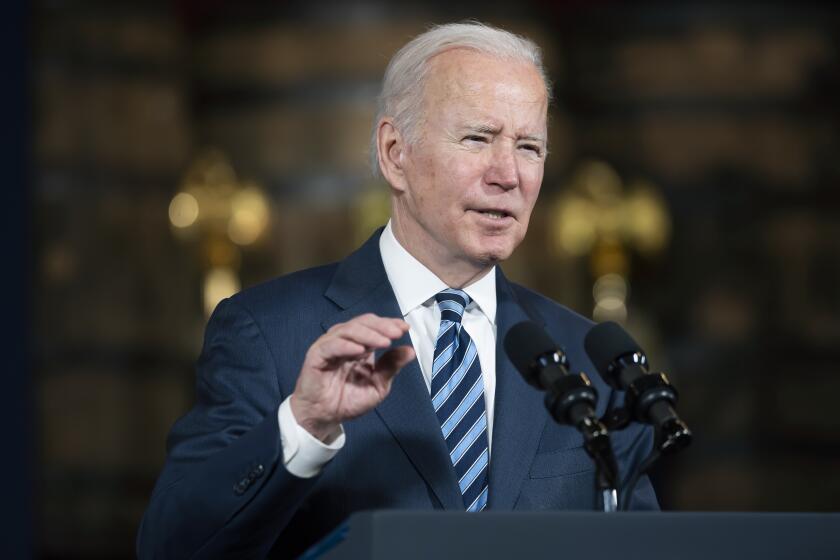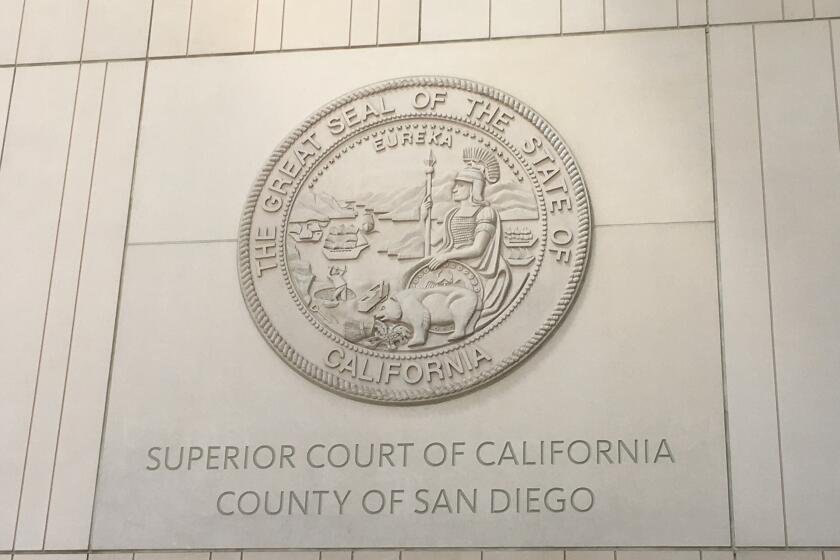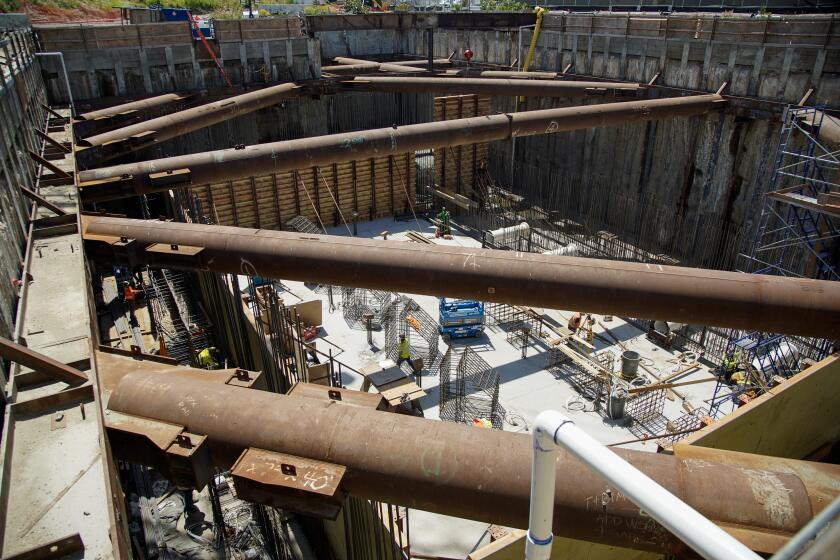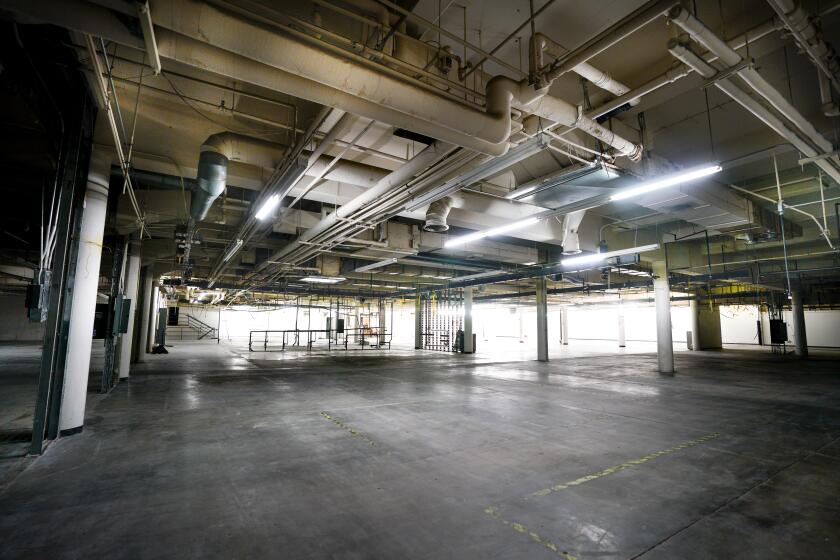The transition from Trump to Biden is already being felt in San Diego
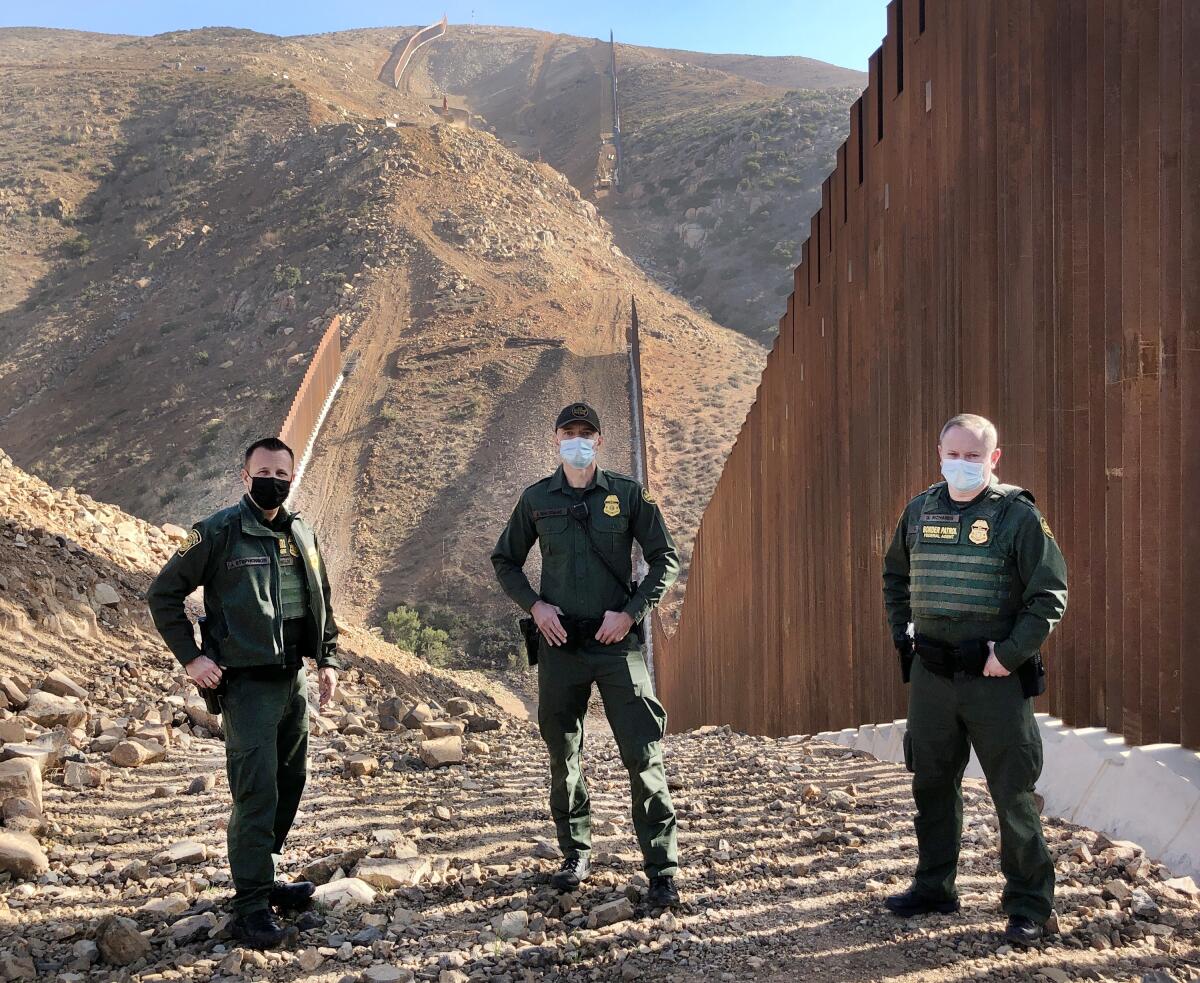
For most San Diegans, the substantial impact of a Biden presidency is months away
It’s only been a few days, and already the official transition of power in Washington, D.C., has touched San Diego in concrete ways.
A flurry of executive orders from President Joe Biden’s first 24 hours in office has halted construction on border wall projects, pledged further protection for the county’s 27,000 DACA recipients, and frozen deportation orders for an unknown number of local migrants.
For the record:
3:22 p.m. Jan. 24, 2021A previous version of this story incorrectly stated the length of time that U.S. Attorney Robert Brewer has served in office.
The immediate changes, if only temporary, mark the sharp ideological contrast between the Trump and Biden administrations, and are just the beginning of more drastic changes expected in the coming days and weeks.
Yet for most San Diegans, the real-world impacts of a Biden presidency will come after he builds his cabinet in Washington and empowers his high-level lieutenants to carry out an ambitious agenda nationwide.
The 110,000 active-duty military in San Diego, and thousands of other federal workers who oversee everything from the border to postal service to forest land to transportation and more, are used to the uncertainty that comes every four to eight years with a new boss in the White House.
“That is part of the nature of federal work,” said Casey Dominguez, a professor of political science and international relations at the University of San Diego. “Research shows that people who work in the federal bureaucracy take that in stride. It’s part of their professionalism to serve whatever president and whatever party by administering the laws of the U.S.”
The vast majority of the federal workforce is made up of career employees rather than political appointees, and changes in leadership at the local level likely won’t happen soon, if at all, according to federal officials in San Diego.
Here are some of the ways that San Diego may be — and already has been — directly impacted by the transition of power in the short term.
Courts
The most notable immediate change in leadership in San Diego could be in the U.S. Attorney’s Office.
U.S. attorneys — there are 93 of them nationwide — are appointed by presidents and confirmed by the Senate. A new administration often means existing U.S. attorneys are replaced with temporary ones while new appointments are processed.
In the Southern District of California, which covers San Diego and Imperial counties, the prosecutorial office under Trump had partially been run by acting and interim U.S. attorneys. Trump’s official pick for U.S. attorney, Robert Brewer, took office two years ago after a lengthy confirmation process. He intends to stay on unless told otherwise.
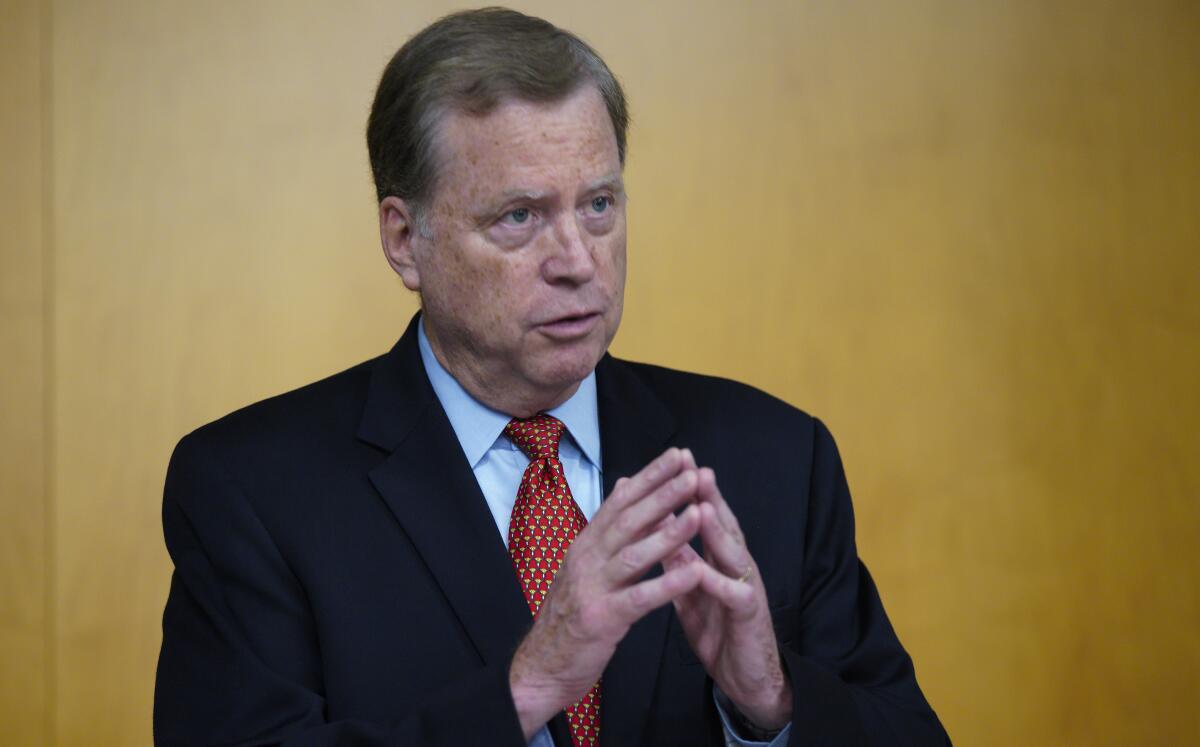
“Mr. Brewer would be honored to continue his service at the pleasure of the new administration and has no plans to resign at this time,” said U.S. Attorney spokesperson Kelly Thornton.
If Brewer is forced out, the second-in-command would be automatically promoted in an acting capacity under the Vacancies Reform Act. That would be Randy Grossman, a longtime colleague of Brewer’s in private practice. Grossman joined the U.S. Attorney’s Office in March.
The Department of Justice could also install an interim U.S. attorney of its choosing, an appointment that could be renewed until a Biden nominee is confirmed.
Such nominations may move quickly with Democrats newly in power.
White House Counsel Dana Remus has already asked Democratic senators in a letter to send their recommendations.
It is also up to Biden to fill five vacancies on the San Diego federal bench. Former President Donald Trump had put forth four candidates but their nominations expired earlier this month without any action by the 116th Congress. And a fifth spot is opening up with the retirement of U.S. District Judge Larry Burns, who is going on senior status and will hear a reduced caseload.
Biden could reconsider any of Trump’s prior nominees, none of which appear controversial.
Shireen Matthews — a former federal prosecutor, now a partner at the prestigious law firm Jones Day — is the only among the four who has appeared before the Senate Judiciary Committee. She could hypothetically move through the confirmation process fastest. The other three are local federal prosecutors Adam Braverman and Michelle Pettit and defense attorney Knut Johnson.
Judicial nominees are traditionally vetted by local commissions set up by home state senators, who then pass the short list of names onto the White House.
Remus has also asked Democratic senators for a list of judicial recommendations, with a focus on “nominating individuals whose legal experiences have been historically underrepresented on the federal bench, including those who are public defenders, civil rights and legal aid attorneys, and those who represent Americans in every walk of life,” according to the Dec. 22 letter obtained by HuffPost.
Border and immigration
Perhaps the most visceral impact of the transition in San Diego is the idling of construction equipment at the border.
In an executive order on his first day in office, Biden paused all border wall projects until the contracts can be reviewed.
“Like every nation, the United States has a right and a duty to secure its borders and protect its people against threats. But building a massive wall that spans the entire southern border is not a serious policy solution,” the order states. “It is a waste of money that diverts attention from genuine threats to our homeland security.”
The 14-miles of international border that begins at San Diego’s coast has already visibly transformed under Trump, with deteriorating landing-mat fencing replaced by two rows of taller steel bollards topped with metal plates.
The new order would appear to affect at least four projects locally.
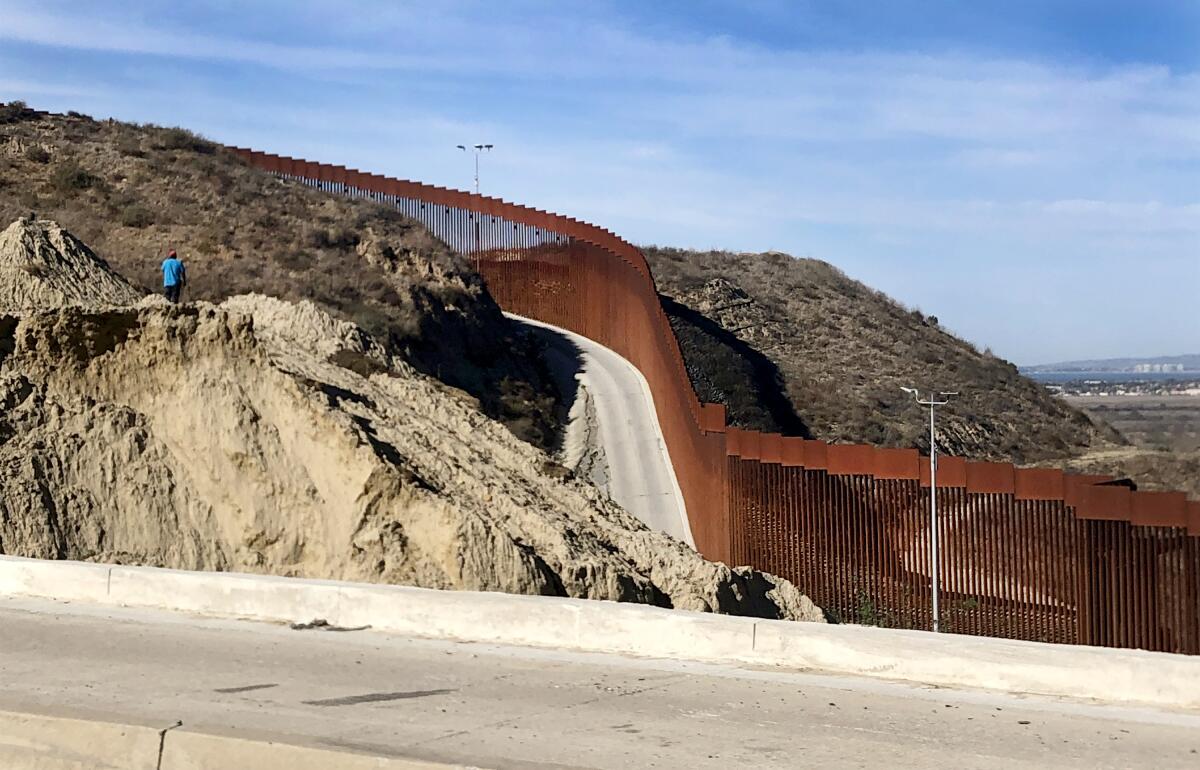
Work had just begun on replacing the short stretch of mesh fencing at Friendship Park with the same new-style steel bollard barrier.
On the other end of the city, construction was well underway to extend the fence-line 3 miles through the rugged Otay Mountain Wilderness. Farther east, bollards were also going up near Campo, a project that has been the source of litigation by Kumeyaay tribal members.
Another project called for a 0.2-mile section of fence to cut across the Tijuana River channel west of the San Ysidro Port of Entry near Las Americas Premium Outlets and was still in the planning stages.
Biden’s order does make exceptions to the pause “for urgent measures needed to avert immediate physical dangers or where an exception is required to ensure that funds appropriated by the Congress fulfill their intended purpose.”
Biden has already started undoing many of the Trump administration’s signature policies involving immigration, changes that are being deeply felt in San Diego.
“The Biden administration has already set a very different tone on the issue of immigration; one that reinforces the very American idea that immigration is essential to who we are as a nation,” said Andrew Nietor, a local immigration attorney, in an email.
The official reinstatement of the Deferred Action for Childhood Arrivals, or DACA, program that grants work permits and temporary protection from deportation to undocumented immigrants who came to the U.S. as children — frequently referred to as “dreamers” — means that tens of thousands of San Diegans will feel more stability in their lives. But it’s still not a permanent congressional solution.
Biden’s immigration bill proposes allowing beneficiaries of the program to get green cards immediately and creating a path for their parents to stay, as well.
A new 100-day moratorium on most deportations is meant to give the administration a chance “to rebuild fair and effective asylum procedures that respect human rights and due process,” according to the White House.
Lawyers are still worried about what will happen to people already enrolled in the “Remain in Mexico” program. Though the Biden administration announced that no new asylum seekers would be added to the program, it has not taken action to help those from Latin America who were forced to wait in Mexico for their asylum cases to proceed in the United States.
“We’re all waiting on pins and needles to see what’s going to happen with them,” said Maria Chavez, a San Diego-based immigration attorney. “Based on DHS’s statement, it seems like they’re not going to be allowed in to resume proceedings any time soon, especially since the border is still closed to non-essential travel.”
Education
The transition of power also means San Diego Unified School District needs to find a new superintendent.
Cindy Marten, who has headed the state’s second-largest district since 2013, has been tapped by the Biden administration to be the deputy secretary of education. She must first be confirmed by the Senate, which district officials expect will happen next month.
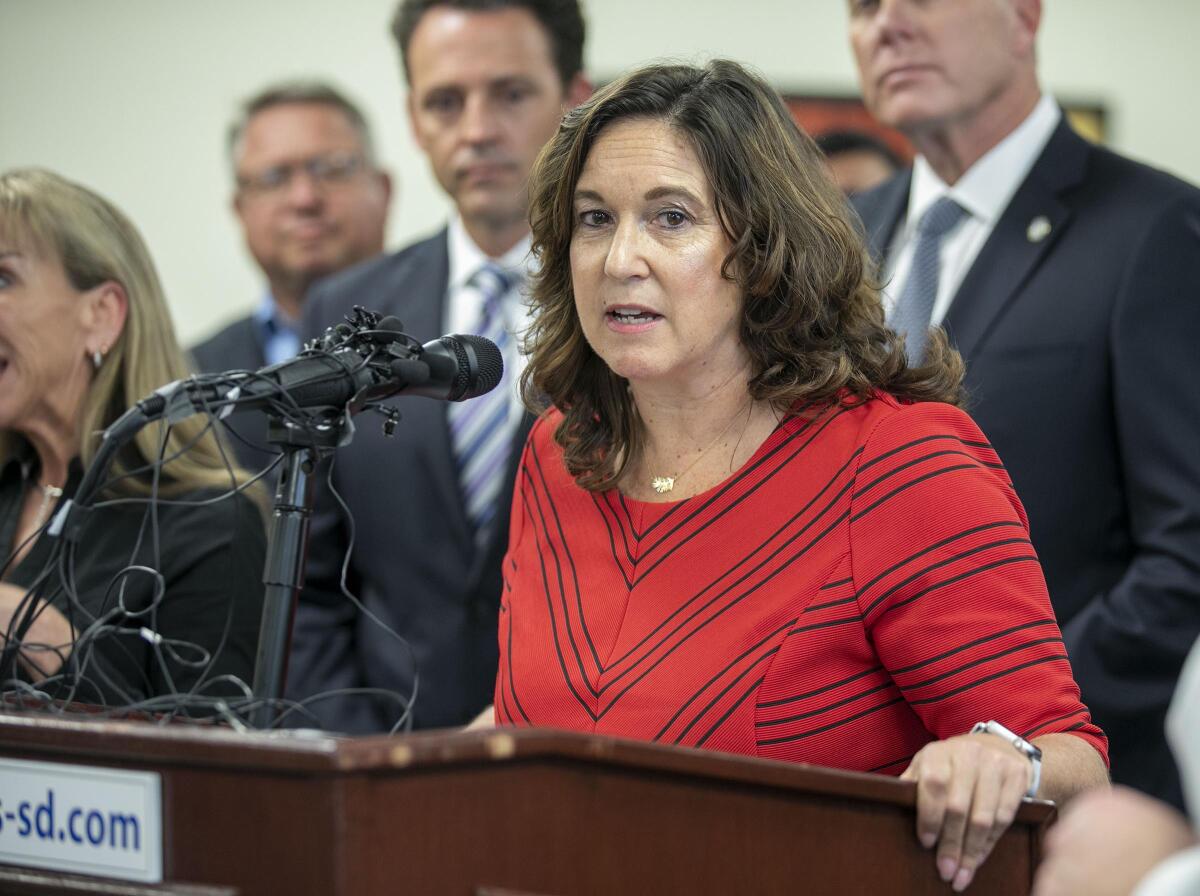
The San Diego Unified School Board chose Area Superintendent Lamont Jackson to replace Marten in the interim. The board said it will meet in the upcoming weeks to decide the process for hiring a permanent superintendent.
As for higher education, college students and grads took notice on Inauguration Day when the president announced that he was extending the date on which people will have to resume paying their federal student loans.
The deadline had been scheduled to expire at the end of the month, and the executive order extended it to Sept. 30. The pause was initially put in place last March, when the pandemic began to inflict widespread financial devastation.
Longer term, it’s possible that Biden will grant additional relief and assistance. He says he supports the idea of forgiving $10,000 or more of federally-backed student loan debt run up by individuals. But he has not committed to Sen. Bernie Sanders’ idea of making public colleges, universities and trade schools tuition free to families that earn less than $125,000 per year.
Future outlook
Longer term, many San Diego leaders are optimistic that Biden’s support of science and environmental stewardship will result in major funding opportunities locally. But nothing is guaranteed, and much will rely on acts of Congress.
Having a Californian as vice president may also help bring additional attention to the region.
County officials and healthcare workers are encouraged by Biden’s COVID-19 strategy but are waiting to see if it will translate into increased vaccine production and distribution, as well as reimbursement to state and local jurisdictions for vaccine administration. The county is spending some $100 million on its vaccine sites.
San Diego, a mecca in biomedical research, could also be a major draw for federal grants.
Schools like UC San Diego and companies like Inovio are already developing and testing COVID-19 vaccines. And institutions like Scripps Research, the La Jolla Institute for Immunology, the Salk Institute and the J. Craig Venter Institute are involved in studying everything from the onset of cancer to fighting diabetes and communicable diseases.
The region also now has an opportunity to attract significant federal funding for new transit projects — including a $177 billion high-speed-rail network — if San Diegans are willing to pony up new tax dollars, said San Diego Association of Governments leader Hasan Ikhrata.
“No question,” Ikhrata said. “It will be easier with this administration than any other we’ve worked with. The opportunity is to really reimagine the future of transportation in the nation and in San Diego.”
Imperial Beach Mayor Serge Dedina has high hopes the Biden presidency will mark a turning point in the decades-long battle to clean up sewage pollution in the South Bay.
Trump’s U.S. Environmental Protection Agency made some efforts to address the flow of tainted water that flows over the border from Tijuana, but Dedina expects that a “more proactive engagement on the environment and with Mexico will be helpful.”
Staff writers Kate Morrissey, Gary Robbins, Joshua Emerson Smith, Gary Warth, Kristen Taketa and Andrew Dyer contributed to this report.
Get Essential San Diego, weekday mornings
Get top headlines from the Union-Tribune in your inbox weekday mornings, including top news, local, sports, business, entertainment and opinion.
You may occasionally receive promotional content from the San Diego Union-Tribune.

